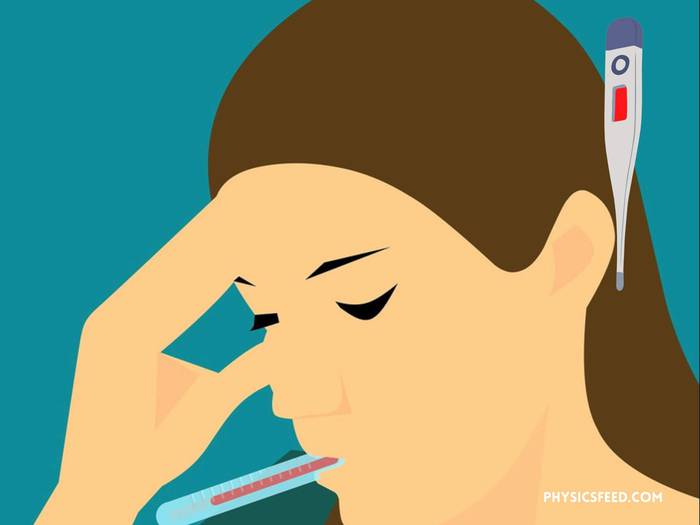A fever (in greek- pyrexia, in Latin- febrile) is a body condition at which the temperature of the body becomes higher than what is called normal. A normal temperature can vary from person to person, but it is usually around 98.6 0 F.
What most people misbelieved is that fever is itself a disease, but in reality, it is not. The presence of a fever is usually related to the stimulation of the body's immune response and is usually a sign that your body is trying to fight an illness or infection. Though highly taken into account, infectious agents are not the only causes of fever. For example, amphetamine abuse and alcohol withdrawal, and environmental fevers - such as those associated with heat stroke and related illnesses can elicit high temperatures to the point of fever.
In brief, most often, you get a fever when your body tries to fight and kill the infectious virus or bacteria.
Here is how the metabolism of our body works and we feel fever.
Our body’s thermostat is mainly read by a brain part called the hypothalamus. Except regulating the body temperature this base part of the brain works for releasing hormones, maintaining daily physiological cycles, controlling appetite, managing sexual behaviour, and regulating emotional responses. In the case of the fever condition, the hypothalamus is triggered by floating biochemical substances called pyrogens. Pyrogen is a biochemical in our body that flows from sites where the immune system has identified potential trouble to the hypothalamus via the bloodstream.
When the hypothalamus detects pyrogens, it tells the body to generate and retain more heat, thus producing a fever condition. In comparison to adults, children typically get higher and quicker fevers reflecting the effects of the pyrogens upon an inexperienced immune system.
In a complete biological term fever is an elevation of body temperature above normal circadian variation as a result of a change in the thermoregulation centre, located in the hypothalamus.
|
Celsius(0C) |
Ferenhits(0F) |
|
|
Hypothermia |
<35 |
<95 |
|
Subnormal |
35-36.7 |
95-97 |
|
Normal |
36.7-37.2 |
97-99 |
|
Mild fever |
37.2-37.8 |
99-100 |
|
Moderate fever |
37.8-39.4 |
100-103 |
|
High fever |
39.4-40.5 |
103-105 |
|
Hyperpyrexia |
>40.5 |
>105 |
General causes of fever
-
Other illness and infection like due to the extreme tiredness, workload,
-
Medicines, including some antibiotics, blood pressure medicines, and anti-seizure medicines.
-
Heat illness: often occurs when a person is exercising, working, or engaging in an activity when the environmental temperature and humidity is high.
-
Several kinds of cancers.
-
Autoimmune diseases: a condition in which your immune system mistakenly attacks the body's own healthy tissue and there are several explanations for this immune attack.
-
Some childhood immunization like Bacillus Calmette–Guérin (BCG) and Diphtheria, Tetanus, Pertussis (DPT).
Symptoms of fever
-
Chills: a sensation of coldness (in most fever types).
-
Increased in body temperature.
-
Rigour: severe shivering.
-
Body pain and joint pain.
-
Headache.
-
Anorexia: loss of appetite for food.
-
Feels dehydrated and weak.
-
Irritation.
Treatment
(Cautions: Remember that these treatment methods are not authorized and not prescribed to be taken in equivalent to physicians prescriptions. These are only for temporary remedy until you get to the physician. Please consult your physician as soon as possible in case you get the fever).
Treatment should be given depending upon the temperature measurement. For making the measurement of body temperature you have to use a standard thermometer (if not habitual with the analogous, you can get a digital thermometer). If the fever is high you imminently have to consult a physician. If you can't reach a physician as soon as possible you are required to then you can use a watered towel (but not full of water and coldness) over your forehead and drink as much water (clean drinking water) as you can. If the case goes sever then you can take medicine like paracetamol (please remember that this is not my authorized medical prescriptions but a temporary, you have to consult a physician as soon as possible so they can guide you with your condition of illness). Adults can also take aspirin, but children with fevers are not refereed to take aspirin.
